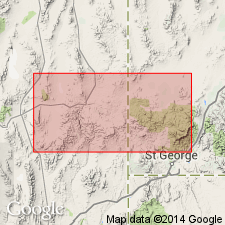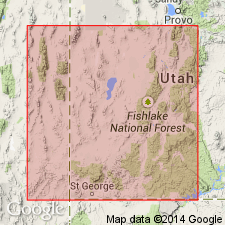
- Usage in publication:
-
- Narrows Tuff Member
- Modifications:
-
- Original reference
- Dominant lithology:
-
- Ignimbrite
- AAPG geologic province:
-
- Great Basin province
Summary:
Narrows Tuff Member of Leach Canyon Formation of Quichapa Group. Moderately to densely welded, light colored, and contains 1 to 2 percent lithic fragments. A simple cooling unit made up of from 1 to 3 ignimbrites. Lower member of formation. Underlies Table Butte Tuff Member (new). Age is Miocene.
Recognized in southwestern Utah and southeastern Nevada. [Type locality: White River Narrows, in T. 1 S., R. 62 E. (unsurveyed), Lincoln Co., eastern NV (fig. 1, loc. 2 of Williams' dissert.; see Rowley and others, 1975, and Anderson and Rowley, 1975).]
Source: US geologic names lexicon (USGS Bull. 1350, p. 519).

- Usage in publication:
-
- Narrows Tuff Member*
- Modifications:
-
- Adopted
- Dominant lithology:
-
- Tuff
- AAPG geologic province:
-
- Great Basin province
Summary:
Pg. B10-B11 (fig. 2), B12-B13; see also Anderson and Rowley, 1975, GSA Spec. Paper 160, p. 1-51. Narrows Tuff Member of Leach Canyon Formation of Quichapa Group is adopted by the USGS [following Williams, 1967, Univ. Washington PhD dissert.; Cook, 1965, Nevada Bur. Mines Rpt., no. 11]. Recognized in southwestern Utah and southeastern Nevada; notably in the Black Mountains and Markagunt Plateau of Iron County, Utah, and the Seaman and Delmar Ranges of Lincoln County, Nevada. Is lower of two members of Leach Canyon Formation. Consists of one or two cooling units. Overlies Hole-In-The-Wall Tuff Member of Isom Formation; underlies Table Butte Member of Leach Canyon. Age is Miocene, based on K-Ar age dates of about 24 Ma (citing Armstrong, 1970, Geochemica et Cosmochimica Acta, v. 34; Fleck and others, 1975, GSA Spec. Paper 160, p. 53-62).
Type locality (citing Williams, 1967, fig. 1, loc. 2): White River Narrows, in T. 1 S., R. 62 E. (unsurveyed), Lincoln Co., eastern NV.
Source: Publication; Changes in stratigraphic nomenclature, 1976 (USGS Bull. 1435-A, p. A70-A71); GNU records (USGS DDS-6; Denver GNULEX).
For more information, please contact Nancy Stamm, Geologic Names Committee Secretary.
Asterisk (*) indicates published by U.S. Geological Survey authors.
"No current usage" (†) implies that a name has been abandoned or has fallen into disuse. Former usage and, if known, replacement name given in parentheses ( ).
Slash (/) indicates name conflicts with nomenclatural guidelines (CSN, 1933; ACSN, 1961, 1970; NACSN, 1983, 2005, 2021). May be explained within brackets ([ ]).

